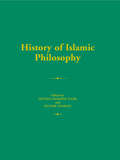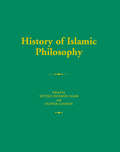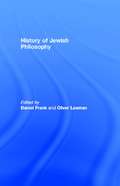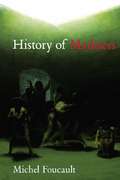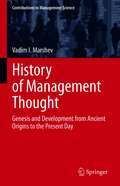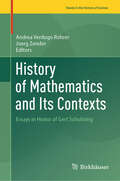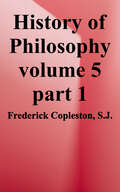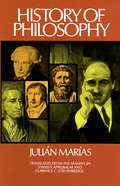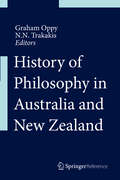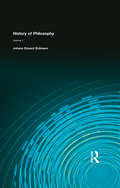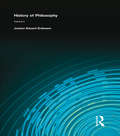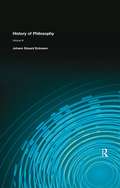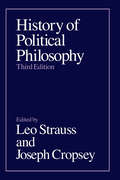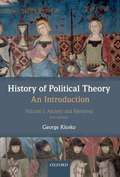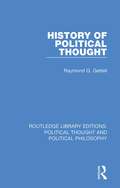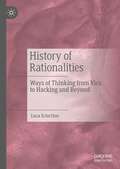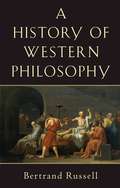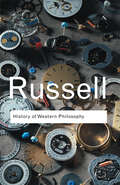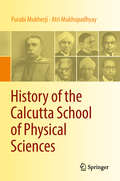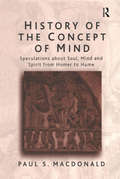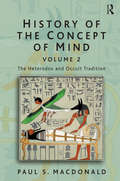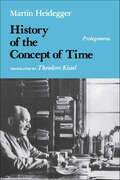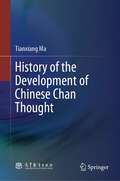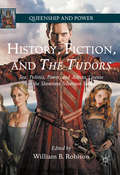- Table View
- List View
History of Islamic Philosophy (Routledge History of World Philosophies #No. 1)
by Seyyed Hossein Nasr Oliver LeamanIslamic philosophy has often been treated as being largely of historical interest, belonging to the history of ideas rather than to philosophical study. This volume successfully overturns that view. Emphasizing the living nature and rich diversity of the subject, it examines the main thinkers and schools of thought, discusses the key concepts of Islamic philosophy and covers a vast geographical area. This indispensable reference tool includes a comprehensive bibliography and an extensive index.
History of Islamic Philosophy (Routledge History of World Philosophies #No. 1)
by Seyyed Hossein Nasr; Oliver LeamanIslamic philosophy has often been treated as being largely of historical interest, belonging to the history of ideas rather than to philosophical study. This volume successfully overturns that view. Emphasizing the living nature and rich diversity of the subject, it examines the main thinkers and schools of thought, discusses the key concepts of Islamic philosophy and covers a vast geographical area. This indispensable reference tool includes a comprehensive bibliography and an extensive index.
History of Jewish Philosophy (Routledge History of World Philosophies)
by Daniel H. Frank Oliver LeamanJewish philosophy is often presented as an addendum to Jewish religion rather than as a rich and varied tradition in its own right, but the History of Jewish Philosophy explores the entire scope and variety of Jewish philosophy from philosophical interpretations of the Bible right up to contemporary Jewish feminist and postmodernist thought. The links between Jewish philosophy and its wider cultural context are stressed, building up a comprehensive and historically sensitive view of Jewish philosophy and its place in the development of philosophy as a whole. Includes:· Detailed discussions of the most important Jewish philosophers and philosophical movements· Descriptions of the social and cultural contexts in which Jewish philosophical thought developed throughout the centuries· Contributions by 35 leading scholars in the field, from Britain, Canada, Israel and the US· Detailed and extensive bibliographies
History of Madness: A History Of Insanity In The Age Of Reason (Routledge Classics Ser.)
by Michel FoucaultWhen it was first published in France in 1961 as Folie et Déraison: Histoire de la Folie à l'âge Classique, few had heard of a thirty-four year old philosopher by the name of Michel Foucault. By the time an abridged English edition was published in 1967 as Madness and Civilization, Michel Foucault had shaken the intellectual world. This translation is the first English edition of the complete French texts of the first and second edition, including all prefaces and appendices, some of them unavailable in the existing French edition. History of Madness begins in the Middle Ages with vivid descriptions of the exclusion and confinement of lepers. Why, Foucault asks, when the leper houses were emptied at the end of the Middle Ages, were they turned into places of confinement for the mad? Why, within the space of several months in 1656, was one out of every hundred people in Paris confined? Shifting brilliantly from Descartes and early Enlightenment thought to the founding of the Hôpital Général in Paris and the work of early psychiatrists Philippe Pinel and Samuel Tuke, Foucault focuses throughout, not only on scientific and medical analyses of madness, but also on the philosophical and cultural values attached to the mad. He also urges us to recognize the creative and liberating forces that madness represents, brilliantly drawing on examples from Goya, Nietzsche, Van Gogh and Artaud. The History of Madness is an inspiring and classic work that challenges us to understand madness, reason and power and the forces that shape them.
History of Management Thought: Genesis and Development from Ancient Origins to the Present Day (Contributions to Management Science)
by Vadim I. MarshevThis book describes the millennia-long process of the genesis, formation, struggle, and change of views on the management of social organizations in various countries around the world; in other words, it characterizes the worldwide evolution of the History of Management Thought (HMT) - ideas, concepts, theories, paradigms, and scientific schools - from Antiquity to the present. The book is the outcome of extensive research, based on the analysis, generalization, and systematization of foreign and domestic published literature, as well as on the gathering and analysis of unique archival materials. For the first time in the historical and managerial literature, the book puts forward original definitions of three historical and managerial sciences - the History of Management, the History of Management Thought, and the Historiography of Historical and Managerial Research. It addresses the main challenges in pursuing Historical and Scientific Research (HSR), the main “subject” levels of HSR and specific methodological problems concerning HMT, as well as epistemological methods for identifying key factors in and causes of the advent and evolution of HMT. This book presents both the origins of management thought dating back to the 5th millennium BC and the latest management concepts of the early 21st century. In particular, it traces the origins and sources of management thought, reflected in the works of thinkers and statesmen of the Ancient World (Egypt, Western Asia, China, India, Greece, and Rome), the era of feudalism, and the Middle Ages (Byzantium, Western Europe, and England), the era of inception capitalism (Western Europe and the USA), as well as the new and recent history of management thought of the 20th and 21st centuries. In addition, for the first time in History of Management literature, it presents the history of Russian management thought from the 9th century to modern concepts and scientific schools.
History of Mathematics and Its Contexts: Essays in Honor of Gert Schubring (Trends in the History of Science)
by Andrea Verdugo Rohrer Joerg ZenderThis book celebrates Gert Schubring's 80th birthday and honors his impactful contributions to the field of history of mathematics and its education. Recognized with the prestigious Hans Freudenthal Award in 2019, Schubring's academic work sets the tone for this volume. The thoughtfully curated articles in this collection offer insightful studies on textbooks and biographies of key figures in mathematics and mathematics education, contextualizing their significance within the broader historical landscape, and providing the readers with a deeper understanding of the development of the history of mathematics and its education. Researchers as well as curious readers and students will find this collection to be a valuable resource in the field.
History of Philosophy
by S. J. Frederick CoplestonConceived originally as a serious presentation of the development of philosophy for Catholic seminary students, Frederick Copleston's nine-volume A History Of Philosophy has journeyed far beyond the modest purpose of its author to universal acclaim as the best history of philosophy in English. <p><p>Copleston, an Oxford Jesuit of immense erudition who once tangled with A.J. Ayer in a fabled debate about the existence of God and the possibility of metaphysics, knew that seminary students were fed a woefully inadequate diet of theses and proofs, and that their familiarity with most of history's great thinkers was reduced to simplistic caricatures. Copleston set out to redress the wrong by writing a complete history of Western Philosophy, one crackling with incident an intellectual excitement - and one that gives full place to each thinker, presenting his thought in a beautifully rounded manner and showing his links to those who went before and to those who came after him.
History of Philosophy
by Julian MariasThorough and lucid survey of Western philosophy from pre-Socratics to mid 20th century: major figures, currents, trends, literature, significance, and more. Valuable section on contemporary philosophy -- Brentano, Ortega, Heidegger, others. One of the best elementary history of philosophy available. "Brevity and clarity of exposition..." -- Ethics.
History of Philosophy in Australia and New Zealand
by Graham Oppy N. N. TrakakisThe History of Philosophy in Australia and New Zealand is a comprehensive account of the historical development of philosophy in Australia and New Zealand, from the establishment of the first Philosophy Chair in Australasia in 1886 at the University of Melbourne to the current burgeoning of Australasian philosophy. The work is divided into two broad sections, the first providing an account of significant developments and events during various periods in the history of Australasian philosophy, and the second focusing on ideas and theories that have been influential in various disciplines within Australasian philosophy. The work consists of chapters contributed by various philosophers, on specific fields of inquiry or historical periods within Australasian philosophy.
History of Philosophy: Volume I
by Erdmann, Johann EduardFirst published in 2002. Routledge is an imprint of Taylor & Francis, an informa company.
History of Philosophy: Volume II
by Erdmann, Johann EduardFirst published in 2002. Routledge is an imprint of Taylor & Francis, an informa company.
History of Philosophy: Volume III
by Erdmann, Johann EduardFirst published in 1964 and reprinted in 2013. This is a text is a history of Philosophy as compiled by Johann Eduard Erdmann, professor of Philosophy in the University of Halle and translated into English by Williston S. Hough. This is Volume III of three and covers German Philosophy since Hegel
History of Political Philosophy
by Leo Strauss and Joseph CropseyThis volume provides an unequaled introduction to the thought of chief contributors to the Western tradition of political philosophy from classical Greek antiquity to the twentieth century. Written by specialists on the various philosophers, this third edition has been expanded significantly to include both new and revised essays.
History of Political Theory: Volume I: Ancient And Medieval
by George KloskoHistory of Political Theory: An Introduction is an engaging introduction to the main figures in the history of Western Political Theory and their most important works. Volume I traces the development of political theory "from the beginning" in ancient Greece through the Reformation. Main subjects examined include the Classical political theory of the Greek polis, the Hellenistic period, the rise of Christian political theory, political theory of the middle ages, and the Reformation. Major figures examined include Socrates, Plato, Aristotle, St. Augustine, St. Thomas, Marsilius of Padua, and Martin Luther. Throughout, the great theorists are closely examined in their historical contexts, with extensive quotations allowing them to speak for themselves.
History of Political Thought (Routledge Library Editions: Political Thought and Political Philosophy #25)
by Raymond G. GettellFirst published in 1924. This extensive volume explores the history of political theory from Ancient Greece up until proletarian thought in the early twentieth century. The author pays particular attention to the connection between economic and political theory during the eighteenth and nineteenth centuries. History of Political Thought will be of great interest to students of history, politics, and philosophy.
History of Rationalities: Ways of Thinking from Vico to Hacking and Beyond
by Luca SciortinoOver time, philosophers and historians of science have introduced different notions of 'ways of thinking'. This book presents, compares, and contrasts these different notions. It focuses primarily on Ian Hacking’s idea of 'style of reasoning' in order to assess and develop it into a more systematic theory of scientific thought, arguing that Hacking’s theory implies epistemic relativism. Luca Sciortino also discusses the implications of Hacking’s ideas for the study of the problem of contingency and inevitability in the development of scientific knowledge
History of Ukraine - 2nd, Revised Edition
by Paul Robert MagocsiFirst published in 1996, A History of Ukraine quickly became the authoritative account of the evolution of Europe's second largest country. In this fully revised and expanded second edition, Paul Robert Magocsi examines recent developments in the country's history and uses new scholarship in order to expand our conception of the Ukrainian historical narrative.New chapters deal with the Crimean Khanate in the sixteenth and seventeenth centuries, and new research on the pre-historic Trypillians, the Italians of the Crimea and the Black Death, the Karaites, Ottoman and Crimean slavery, Soviet-era ethnic cleansing, and the Orange Revolution is incorporated. Magocsi has also thoroughly updated the many maps that appear throughout.Maintaining his depiction of the multicultural reality of past and present Ukraine, Magocsi has added new information on Ukraine's peoples and discusses Ukraine's diasporas. Comprehensive, innovative, and geared towards teaching, the second edition of A History of Ukraine is ideal for both teachers and students.
History of Western Philosophy (Counterpoint Ser.)
by Bertrand RussellSince its first publication in 1945? Lord Russell's A History of Western Philosophy has been universally acclaimed as the outstanding one-volume work on the subject -- unparalleled in its comprehensiveness, its clarity, its erudition, its grace and wit. In seventy-six chapters he traces philosophy from the rise of Greek civilization to the emergence of logical analysis in the twentieth century. Among the philosophers considered are: Pythagoras, Heraclitus, Parmenides, Empedocles, Anaxagoras, the Atomists, Protagoras, Socrates, Plato, Aristotle, the Cynics, the Sceptics, the Epicureans, the Stoics, Plotinus, Ambrose, Jerome, Augustine, Benedict, Gregory the Great, John the Scot, Aquinas, Duns Scotus, William of Occam, Machiavelli, Erasmus, More, Bacon, Hobbes, Descartes, Spinoza, Leibniz, Locke, Berkeley, Hume, Rousseau, Kant, Hegel, Schopenhauer, Nietzsche, the Utilitarians, Marx, Bergson, James, Dewey, and lastly the philosophers with whom Lord Russell himself is most closely associated -- Cantor, Frege, and Whitehead, co-author with Russell of the monumental Principia Mathematica.
History of Western Philosophy: Collectors Edition (Routledge Classics)
by Bertrand RussellFirst published in 1946, History of Western Philosophy went on to become the best-selling philosophy book of the twentieth century. A dazzlingly ambitious project, it remains unchallenged to this day as the ultimate introduction to Western philosophy. Providing a sophisticated overview of the ideas that have perplexed people from time immemorial, it is 'long on wit, intelligence and curmudgeonly scepticism', as the New York Times noted, and it is this, coupled with the sheer brilliance of its scholarship, that has made Russell's History of Western Philosophy one of the most important philosophical works of all time.
History of the Calcutta School of Physical Sciences
by Purabi Mukherji Atri MukhopadhyayThis book highlights the role of Sir Asutosh Mookerjee, founder of the Calcutta school of physics and the Calcutta Mathematical Society, and his talented scholars – Sir C.V. Raman, D.M. Bose, S.N. Bose, M.N. Saha, Sir K.S. Krishnan and S.K. Mitra – all of whom played a significant role in fulfilling their goal of creating an outstanding school of physical sciences in the city of Calcutta. The main objective of the book is to bring to the fore the combined contributions of the greatest physicists of India, who in the colonial period worked with practically no modern amenities and limited financial resources, but nonetheless with total dedication and self-confidence, which is unmatched in today’s world. The book presents the golden age of the physical sciences in India in compact form; in addition, small anecdotes, mostly unknown to many, have been brought the forefront. The book consists of 10 chapters, which include papers by these distinguished scientists along with detailed accounts of their academic lives and main research contributions, particularly during their time in Calcutta. A synopsis of the contents is provided in the introductory chapter. In the following chapters, detailed discussions are presented in straightforward language. The complete bibliographies of the great scientists have been added at the end. This book will be of interest to historians, philosophers of science, linguists, anthropologists, students, research scholars and general readers with a love for the history of science.
History of the Concept of Mind: Volume 1: Speculations About Soul, Mind and Spirit from Homer to Hume
by PaulS. MacdonaldIn the 20th century theorists of mind were almost exclusively concerned with various versions of the materialist thesis, but prior to current debates accounts of soul and mind reveal an extraordinary richness and complexity which bear careful and impartial investigation. This book is the first single-authored, comprehensive work to examine the historical, linguistic and conceptual issues involved in exploring the basic features of the human mind - from its most remote origins to the beginning of the modern period. MacDonald traces the development of an armature of psychical concepts from the Old Testament and Homer's works to the 18th century advocacy of an empirical science of the mind. Along the way, detailed attention is paid to the Presocratics, Plato, Aristotle, the Stoics and Epicurus, before turning to look at the New Testament, Neoplatonism, Augustine, Medieval Islam, Aquinas and Dante. Treatment of Renaissance theories is followed by an unusual (perhaps unique) chapter on the words "soul" and "mind" in English literature from Chaucer to Shakespeare; the story then rejoins the mainstream with analyses of Descartes, Spinoza, Leibniz, Hobbes, Locke, Berkeley, and Hume. Chapter-focused bibliographies.
History of the Concept of Mind: Volume 2: The Heterodox and Occult Tradition
by Paul S. MacdonaldExploring the 'roads less travelled', MacDonald continues his monumental essay in the history of ideas. The history of heterodox ideas about the concept of mind takes the reader from the earliest records about human nature in Ancient Egypt, the Ancient Near East, and the Zoroastrian religion, through the secret teachings in the Hermetic and Gnostic scriptures, and into the transformation of ideas about the mind, soul and spirit in the late antique and early medieval epochs. These transitions include discussion of the influence of Central Asian shamanism, Manichean ideas about the soul in light and darkness, and Neoplatonic theurgy, 'working-on-god-within'. Sections on the medieval period are concerned with the rediscovery of magical practices and occult doctrines from Roger Bacon to Francis Bacon, the adaptation of Neoplatonic and esoteric ideas in the medieval Christian mystics, and the survival of these ideas mixed with natural science in the works of von Helmont, Leibniz and Goethe. The book concludes with an investigation of the many forms of dualism in accounts of the human mind and soul, and the concept of dual-life which underpins our aspiration to understand how humans could have an immortal nature like the gods.
History of the Concept of Time: Prolegomena (Studies in Continental Thought)
by Martin HeideggerHeidegger's lecture course at the University of Marburg in the summer of 1925, an early version of Being and Time (1927), offers a unique glimpse into the motivations that prompted the writing of this great philosopher's master work and the presuppositions that gave shape to it. The book embarks upon a provisional description of what Heidegger calls "Dasein," the field in which both being and time become manifest. Heidegger analyzes Dasein in its everydayness in a deepening sequence of terms: being-in-the-world, worldhood, and care as the being of Dasein. The course ends by sketching the themes of death and conscience and their relevance to an ontology that makes the phenomenon of time central. Theodore Kisiel's outstanding translation premits English-speaking readers to appreciate the central importance of this text in the development of Heidegger's thought.
History of the Development of Chinese Chan Thought
by Tianxiang MaThe book aims to describe the history of Chan (Japanese Zen) School thought from the standpoint of social history. Chan, a school of East Asian Buddhism, was influential on all levels of societies in the region because of its intellectual and aesthetic appeal. In China, Chan infiltrated all levels of society, mainly because it engaged with society and formed the mainstream of Buddhism from the tenth or eleventh centuries through to the twentieth century. This book, taking a critical stance, examines the entire history of Chan thought and practice from the viewpoint of a modern Chinese scholar, not a practitioner, but an intellectual historian who places ideological developments in social contexts. The author suggests that core elements of Chan have their origins in Daoist philosophers, especially Zhuangzi, and not in Indian Buddhist concepts. Covering the period from the sixth century into the twentieth century, it deals with Chan interactions with neo-Confucianism, Quanzhen Daoism, and Gongyang new text philology, as well as with literature and scholarship, its fusion with Pure Land Buddhism, and its syncretic tendencies. Chan’s exchanges with emperors from the Song, Yuan, Ming, and Qing Dynasty, as well as the motives of some loyalists of the Ming Dynasty for joining Chan after the fall of the Ming, are described. The book concludes with an examination of the views of Chan of Hu Shi, D.T. Suzuki, and the scholar-monk Yinshun.
History, Fiction, and The Tudors: Sex, Politics, Power, and Artistic License in the Showtime Television Series (Queenship and Power)
by William B. RobisonThis is the first book-length study of the award-winning historical drama The Tudors. In this volume twenty distinguished scholars separate documented history, plausible invention, and outright fantasy in a lively series of scholarly, but accessible and engaging essays. The contributors explore topics including Henry VIII, Catherine of Aragon, Anne Boleyn, his other wives and family, gender and sex, kingship, the court, religion, and entertainments.
